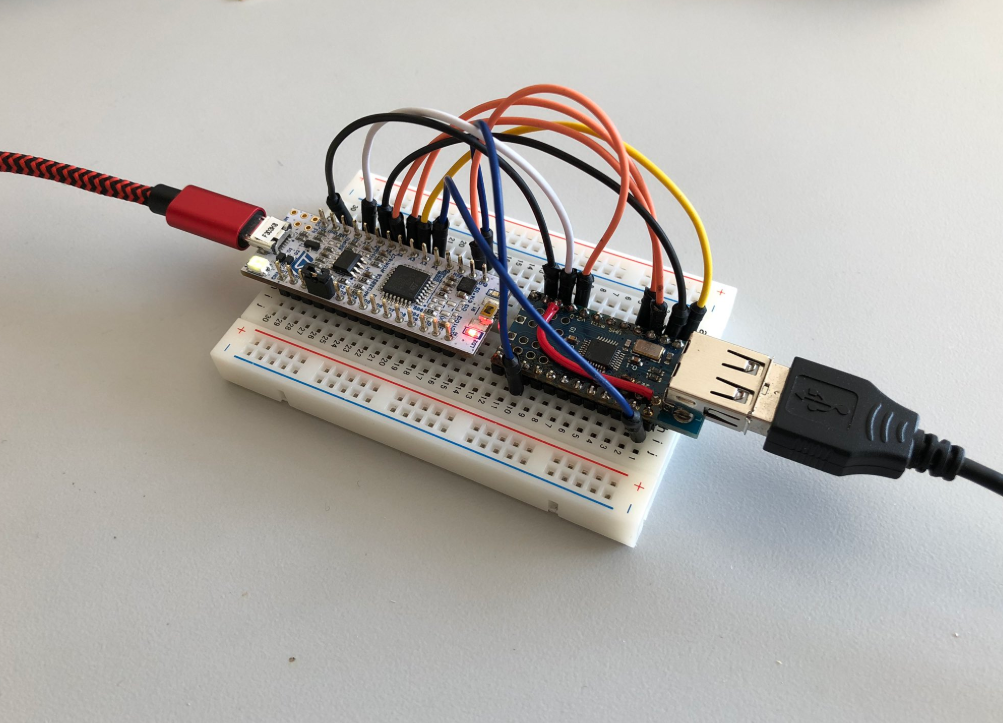Library to use Arduino USB host shield on mbed
ArduinoのUSB Host Shield 2.0をmbedで使えるようにしたライブラリです。
大体のコードがArduinoからそのまま移植可能です。
Arduino UNOやMega用のホストシールド以外にもミニサイズのホストシールドでも使用可能です

シールドについて
3.3VのI/O用にシールドの改造が必要になりますがネット上に記事がたくさんあるのでそちらを参考にしてください
接続例

使い方
Arduinoのコードと違うのはUSBのインスタンスの宣言部分のみです。
ピンを自分で指定できるようにしたので使いやすくなりました。
仕様
- Arduinoのmillis関数、micros関数の移植のために内部でTimerクラスを使用しています。
main.cpp
#include "mbed.h"
#include <PS3BT.h>
#include <usbhub.h>
Serial pc(USBTX, USBRX, 115200);
//Nucleo f303k8用
USB Usb(A6, A5, A4, A3, A2); // mosi, miso, sclk, ssel, intr
BTD Btd(&Usb);
PS3BT PS3(&Btd);
int main()
{
bool printAngle = false;
if (Usb.Init() == -1)
{
pc.printf("\r\nOSC did not start");
while (1); // Halt
}
pc.printf("\r\nPS3 USB Library Started");
while (1)
{
Usb.Task();
if (PS3.PS3Connected || PS3.PS3NavigationConnected) {
if (PS3.getAnalogHat(LeftHatX) > 137 || PS3.getAnalogHat(LeftHatX) < 117 || PS3.getAnalogHat(LeftHatY) > 137 || PS3.getAnalogHat(LeftHatY) < 117 || PS3.getAnalogHat(RightHatX) > 137 || PS3.getAnalogHat(RightHatX) < 117 || PS3.getAnalogHat(RightHatY) > 137 || PS3.getAnalogHat(RightHatY) < 117)
{
pc.printf("\r\nLeftHatX: %d", PS3.getAnalogHat(LeftHatX));
pc.printf("\tLeftHatY: %d", PS3.getAnalogHat(LeftHatY));
if (PS3.PS3Connected)
{ // The Navigation controller only have one joystick
pc.printf("\tRightHatX: %d", PS3.getAnalogHat(RightHatX));
pc.printf("\tRightHatY: %d", PS3.getAnalogHat(RightHatY));
}
}
// Analog button values can be read from almost all buttons
if (PS3.getAnalogButton(L2) || PS3.getAnalogButton(R2))
{
pc.printf("\r\nL2: %d", PS3.getAnalogButton(L2));
if (!PS3.PS3NavigationConnected)
{
pc.printf("\tR2: %d", PS3.getAnalogButton(R2));
}
}
if (PS3.getButtonClick(PS))
{
PS3.disconnect();
pc.printf("\r\nPS");
}
if (PS3.getButtonClick(TRIANGLE))
pc.printf("\r\nTriangle");
if (PS3.getButtonClick(CIRCLE))
pc.printf("\r\nCircle");
if (PS3.getButtonClick(CROSS))
pc.printf("\r\nCross");
if (PS3.getButtonClick(SQUARE))
pc.printf("\r\nSquare");
if (PS3.getButtonClick(UP))
{
pc.printf("\r\nUp");
PS3.setLedOff();
PS3.setLedOn(CONTROLLER_LED4);
}
if (PS3.getButtonClick(RIGHT))
{
pc.printf("\r\nRight");
PS3.setLedOff();
PS3.setLedOn(CONTROLLER_LED1);
}
if (PS3.getButtonClick(DOWN))
{
pc.printf("\r\nDown");
PS3.setLedOff();
PS3.setLedOn(CONTROLLER_LED2);
}
if (PS3.getButtonClick(LEFT))
{
pc.printf("\r\nLeft");
PS3.setLedOff();
PS3.setLedOn(CONTROLLER_LED3);
}
if (PS3.getButtonClick(L1))
pc.printf("\r\nL1");
if (PS3.getButtonClick(L3))
pc.printf("\r\nL3");
if (PS3.getButtonClick(R1))
pc.printf("\r\nR1");
if (PS3.getButtonClick(R3))
pc.printf("\r\nR3");
if (PS3.getButtonClick(SELECT))
{
pc.printf("\r\nSelect - ");
PS3.printStatusString();
}
if (PS3.getButtonClick(START))
{
pc.printf("\r\nStart");
printAngle = !printAngle;
}
if (printAngle)
{
pc.printf("\r\nPitch: %.3lf", PS3.getAngle(Pitch));
pc.printf("\tRoll: %.3lf", PS3.getAngle(Roll));
}
}
else
{
pc.printf("not connect\n");
}
}
}
USB_Host/BTHID.h
- Committer:
- robo_ichinoseki_a
- Date:
- 2020-05-02
- Revision:
- 1:da31140f2a1c
- Parent:
- 0:b1ce54272580
File content as of revision 1:da31140f2a1c:
/* Copyright (C) 2013 Kristian Lauszus, TKJ Electronics. All rights reserved.
This software may be distributed and modified under the terms of the GNU
General Public License version 2 (GPL2) as published by the Free Software
Foundation and appearing in the file GPL2.TXT included in the packaging of
this file. Please note that GPL2 Section 2[b] requires that all works based
on this software must also be made publicly available under the terms of
the GPL2 ("Copyleft").
Contact information
-------------------
Kristian Lauszus, TKJ Electronics
Web : http://www.tkjelectronics.com
e-mail : kristianl@tkjelectronics.com
*/
#ifndef _bthid_h_
#define _bthid_h_
#include "BTD.h"
#include "hidboot.h"
#define KEYBOARD_PARSER_ID 0
#define MOUSE_PARSER_ID 1
#define NUM_PARSERS 2
/** This BluetoothService class implements support for Bluetooth HID devices. */
class BTHID : public BluetoothService {
public:
/**
* Constructor for the BTHID class.
* @param p Pointer to the BTD class instance.
* @param pair Set this to true in order to pair with the device. If the argument is omitted then it will not pair with it. One can use ::PAIR to set it to true.
* @param pin Write the pin to BTD#btdPin. If argument is omitted, then "0000" will be used.
*/
BTHID(BTD *p, bool pair = false, const char *pin = "0000");
/** @name BluetoothService implementation */
/** Used this to disconnect the devices. */
void disconnect();
/**@}*/
/**
* Get HIDReportParser.
* @param id ID of parser.
* @return Returns the corresponding HIDReportParser. Returns NULL if id is not valid.
*/
HIDReportParser *GetReportParser(uint8_t id) {
if (id >= NUM_PARSERS)
return NULL;
return pRptParser[id];
};
/**
* Set HIDReportParser to be used.
* @param id Id of parser.
* @param prs Pointer to HIDReportParser.
* @return Returns true if the HIDReportParser is set. False otherwise.
*/
bool SetReportParser(uint8_t id, HIDReportParser *prs) {
if (id >= NUM_PARSERS)
return false;
pRptParser[id] = prs;
return true;
};
/**
* Set HID protocol mode.
* @param mode HID protocol to use. Either USB_HID_BOOT_PROTOCOL or HID_RPT_PROTOCOL.
*/
void setProtocolMode(uint8_t mode) {
protocolMode = mode;
};
/**@{*/
/**
* Used to set the leds on a keyboard.
* @param data See ::KBDLEDS in hidboot.h
*/
void setLeds(struct KBDLEDS data) {
setLeds(*((uint8_t*)&data));
};
void setLeds(uint8_t data);
/**@}*/
/** True if a device is connected */
bool connected;
/** Call this to start the pairing sequence with a device */
void pair(void) {
if(pBtd)
pBtd->pairWithHID();
};
protected:
/** @name BluetoothService implementation */
/**
* Used to pass acldata to the services.
* @param ACLData Incoming acldata.
*/
void ACLData(uint8_t* ACLData);
/** Used to run part of the state machine. */
void Run();
/** Use this to reset the service. */
void Reset();
/**
* Called when a device is successfully initialized.
* Use attachOnInit(void (*funcOnInit)(void)) to call your own function.
* This is useful for instance if you want to set the LEDs in a specific way.
*/
void onInit() {
if(pFuncOnInit)
pFuncOnInit(); // Call the user function
OnInitBTHID();
};
/**@}*/
/** @name Overridable functions */
/**
* Used to parse Bluetooth HID data to any class that inherits this class.
* @param len The length of the incoming data.
* @param buf Pointer to the data buffer.
*/
virtual void ParseBTHIDData(uint8_t len __attribute__((unused)), uint8_t *buf __attribute__((unused))) {
return;
};
/** Called when a device is connected */
virtual void OnInitBTHID() {
return;
};
/** Used to reset any buffers in the class that inherits this */
virtual void ResetBTHID() {
return;
}
/**@}*/
/** L2CAP source CID for HID_Control */
uint8_t control_scid[2];
/** L2CAP source CID for HID_Interrupt */
uint8_t interrupt_scid[2];
private:
HIDReportParser *pRptParser[NUM_PARSERS]; // Pointer to HIDReportParsers.
/** Set report protocol. */
void setProtocol();
uint8_t protocolMode;
void L2CAP_task(); // L2CAP state machine
bool activeConnection; // Used to indicate if it already has established a connection
/* Variables used for L2CAP communication */
uint8_t control_dcid[2]; // L2CAP device CID for HID_Control - Always 0x0070
uint8_t interrupt_dcid[2]; // L2CAP device CID for HID_Interrupt - Always 0x0071
uint8_t l2cap_state;
};
#endif